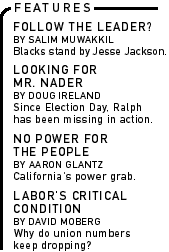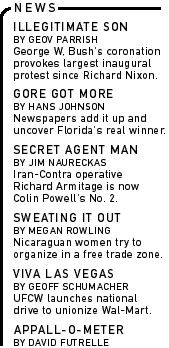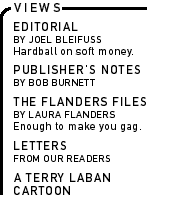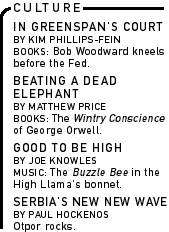

|

|

|

|
| |
|
|
|
Buzzle Bee We are only three months into the year 2001, but so far, it must be unanimously agreed, the future is a disappointment. Instead of heralding an age of anti-gravity shoes, shiny silver tunics, world peace and casual lunch dates on the moon, the 21st century--grimly presided over in suits and ties, or worse, polo shirts--has prosaically carried forward all the unfinished business of the 20th. The future, as it once was vaguely understood in the annals of sci-fi, is a mirage from the past. But thanks in part to musicians like Sean O'Hagan, at least one crucial component of that evolved utopia--the soundtrack--is here right now. O'Hagan is the leader of the High Llamas, a strange band with a strange name who have been making beautifully strange music lately. On their new album Buzzle Bee, tree-climbing chord progressions collide with quivering vibraphone and marimba ("Pat Mingus"); oddly sexual French ad jingles circa 1965 recombine with flaxen vocals and gurgling analog synths ("Get into the Galley Shop"); while space-age lullabies float past lyrical impressions of exploration and observation ("Bobby's Court"). A little bossa in places and very nova all around, this is full-bodied but succinct new music with texture, subtly yet tectonically shifting tempos and dimensions in a gossamer and polychromatic web. Beginning not as a group but as the title of O'Hagan's 1990 debut solo LP (which
A good case in point was 1996's sprawling 77-minute epic, Hawaii, a blissed-out cabin idyll suspended in a warm goo of organs, horns and emotive melody by turns thrilling and tedious; often returning to drawn-out variations on the same theme, the album could have benefited from more Wilsonesque pop concision. On 1998's Cold and Bouncy, the group imagined what Pet Sounds would have sounded like in the age of electronica (and twice as long). The title, it turned out, was too accurate: Pleasantly shimmering to a fault, it very quickly bounced away without a trace. But 1999's underappreciated Snowbug brought O'Hagan's own songwriting skills back to the fore, blending the far-out editing techniques of Cold and Bouncy with a self-assured control over musical influences, which broadened to include the carefree kiddie-rock aesthetic of the Free Design and the genial smarminess of '60s-era sexploitation soundtracks by Ennio Morricone--all without a single smirk. However, as O'Hagan tells me over tea at a Chicago café, his erstwhile label, V2 Records, was not that interested in Snowbug's weird charms. Made with the help of several of Chicago's underground all-stars (Jim O'Rourke, John McEntire, Steve Albini) and O'Hagan's South London neighbors in Stereolab, the American pressing of the album was briskly snapped up by the nerdy muso set. But the label "wouldn't re-press it," O'Hagan says. "We were supposed to tour, and they pulled the tours. Everything you're supposed to do to support a record, they wouldn't do. And this was their argument: Because we weren't going to sell 200,000 records, they may as well spend no money." The brainchild of Virgin Records mogul and hippie capitalist Sir Richard Branson, V2 originally seemed like it might live up to its claim to marry the personality of a small label with the vast resources of a major. Inevitably, though, it came time to account for the brutal economies of scale in the conglomerated music cartel, where it makes perverse sense to concentrate one's resources on blockbusters (acts like Moby and the Stereophonics, in V2's case) and let the rest wither on the vine. Hung out to dry and left on the shelf, O'Hagan asked to be released from his contract. "They were quite happy to let us go," he says, with a look reminiscent of a neglected midlist novelist. "And I have to say, all the people I trusted and liked at V2 eventually left too." Soon afterward, though, Buzzle Bee was rapidly recorded and released to acclaim last fall on Duophonic, the label owned by O'Hagan's old friends and collaborators in Stereolab. (One of Chicago's popular independents, Drag City, picked it up stateside.) But enough about business, so we change the subject to Buzzle Bee's lyrics, a garden of imagist delights and incongruent syntax where astronauts and mannequins mingle with angels, rye fields and cosmic DJs. I'm particularly struck by "The Passing Bell," the album's entrancing opener, which describes a bucolic daytrip of lazy people-watching; O'Hagan explains that he is in fact singing about William Blake's walks out into the Surrey countryside. "The poets like Blake or Browning are quite interesting figures to me," he says. "These are people out of time, not defined by their own time." He goes on at length about one Blakean musical analogue, the legendary jazzman Moondog: "This 50-year-old bum, with partial sight, lived in the street you know, making his own music ... he's a man out of time ... in 1955 he was doing this." Incidentally, this interview happens to be conducted on Election Night, and the café staff interrupt the jukebox with NPR reports of election returns and exit-polling data. As O'Hagan's conversation excitedly swirls with talk of Browning and Blake and Moondog, I cannot help but pause and note the contrast. Buzzle Bee makes sounds from some distant future--or some distant past--as it washes over the listener in a timeless ooze. The radio may as well be going on about Nixon and Kennedy, or Truman and Dewey, or Kirk and Spock. O'Hagan is not alone out there, however. Part of a supportive community
of forward-looking pop alchemists, fans of Buzzle Bee should
seek out Saint Etienne's recent Sound of Water and Kev Hopper's
Whispering Foils, both of which are graced by O'Hagan's unmistakeable
arrangements and instrumentation; likewise, any Stereolab album
is also worth looking into. Broadcast's moody The Noise Made
By People is another good place to go, as is Boards of Canada's
sly Music Has the Right to Children. While the rest of the
planet seems stuck in the protracted 20th century, all of these
musicians blast off anyway, oblivious to the rubbish clogging the
airwaves. The rest of us just might catch up, maybe by around 2101.
|


